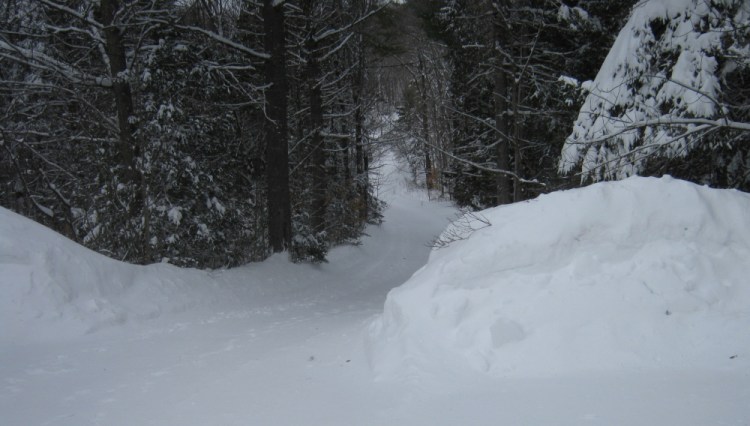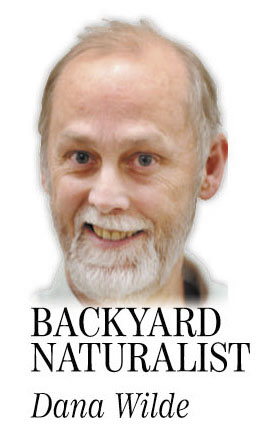After the first snowpocalypse we were still alive, contrary to TV predictions.
So as we’ve done for lifetime after lifetime of snowstorms — including the next two, three, four? since this year’s January burial — we got on our boots and gloves, Bonnie somewhere found my old red and black wool hunting jacket which has shrunk to fit her, took a few deep breaths, grumbled and stepped out onto the deck.
My ruler disappeared into maybe 19 inches of pure white snow. The two non-garage cars were disguised as one large snow drift. I started throwing stuff off the deck to create a walk-through tunnel. Bonnie brought out a broom, forced her way to the cars and started knocking snow onto the trail I was trying to blaze toward the spacious Western Lands of the driveway that the plow guy, Jason Reliability Hunt, had already opened during the night.
Good news: This snow was very light. Up here in Hyperborea we call this kind of snow “light and fluffy.” A rural legend holds that the Inuit people — who are even more hyperly boreal than us and keep their frozen hydrates around longer — have 23, 42, 50, 100 words for snow, while we have just a handful.
But according to linguists, English has at least as many names for snow as the Inuit languages do. Inuit is agglutinative — in other words, endings are affixed to root words, enabling the creation of great, long words which in English would be entire sentences. But in fact, the Inuit refer to snow, ice, slush and so on using roughly the same number of roots we do in English.
To me the word “snow” already does excellent work. It’s old. It incarnated in its present form around 1200 AD, in early Middle English, a descendant of the Old English word snaw, which was cognate with other Germanic words such as Old Frisian sne — all referring to precipitation frozen in crystals.
Old Icelandic has snjor, Old Irish snechtae, Latin nix (compare French neige), and similarly all the way back through Old Slavic, Old Prussian and Avestan (an ancient Iranian language) words. In the beginning was the word sneighw, as linguists reckon the original Indo-European language had it. Most languages spoken in Europe and South Asia grew from Indo-European, which was in use around 5000 BC.
So much snow.
After moving mountains by the garage, we crunched down the driveway to the narrow causeway section over the tree-canopied brook. At that point the grade gets much steeper and 100 feet farther up disgorges the driveway onto life-and-death Route 202.
When the top is slippery, steering onto the road without getting annihilated by a pickup truck going three-quarters the speed of light is tricky. A few times in the past 20 years, we’ve made it most of the way up the slippery slope only to spot a vehicle missiling down the hill from the direction of Troy Union Church and had to stop, only to start sliding back down.
So our mission, whether we accept it or not, is to scrape snow and ice on the launch pavement that might impede the progress of the front wheels.
The preparatory grouching on this mission anticipates how high the snowplows have banked up the mouth of the driveway since Jason cleared it.
After yesterday’s breaking of the snowfall seventh seal, we saw as we neared the summit that the bank of gray, replowed snow was little more than a flat rise. Our hearts leaped up. We scraped what we could down to the gravel. Some of it was already packing itself — by a process known technically as Driveway Glaciation Magic — into a plate that was no longer loose snow but not yet ice. We chipped some of it out.
Then we heard a rumbling sound. Down the hill barreled a juggernaut, with huge steel wings flinging leftover snow onto snowbanks.
Our hearts sank. All our good work would now have to be repeated.
“Crap,” Bonnie said.
“Instant karma’s gonna get you,” I said, knowing that in her case this never happens.
We stood back. The plow zigged gently around our neighbor’s mailbox, then zagged back, headed our way. Angels and ministers of grace defend us! Soon we would be in full-scale excavation samsara.
The driver bent out around our mailbox, then slowed and lifted the great plow wing as he glided past. When he cleared the driveway mouth, the wing dropped back with a clank and continued on its harrowing way.
Hardly believing our good fortune, we waved and thumbsed-up him.
“That was a miracle,” I said. “In all these years of undigging my own grave, no snowplow has ever shown any mercy whatsoever.”
So with new energy we started knocking down the conelike mounds that grow like volcanoes on either side of the driveway and obstruct our view of light-speeding vehicles.
After about five minutes, we simultaneously stopped and listened, like two seagulls staring into the wind. Unbelievably, more rumbling was swelling from the direction of the church. Then, lumbering like a monstrous avenging fury came a second plow truck.
“No way,” I said. “There’s no possible way we’re going to be spared twice in the same lifetime.”
We stood back and waited. Snow flew up from the pavement and the wing was pushing the whole snowbank back four more feet. The truck veered out to avoid the mailboxes and then, at the last second, the driver lifted the plow, slowed down, and stopped right in front of us. The window rolled down.
“How you guys doin’?” he shouted from on high.
“Fantastic, now!” Bonnie said. “Thanks!”
He laughed and waved, gunned the engine, and much to our perplexity, started backing up. Then he dropped the plow and blasted the mound on the right into snowballs. He then angled back onto the road, slammed the big wing back down and resumed pushing the rest of the roadside into the woods.
“This is unbelievable,” I said. “This isn’t just the day after. This is the actual Rapture. We were saved.”
We chipped some more holes in the pre-glaciation, grabbed two newspapers in their plastic bags out of the box, and dragged our shovels back down the hill, across the brook of forgetfulness and on to the ancient snow gates flanking the deck.
“I’m never going to speak a bad word about the plows again,” Bonnie said. “From now on, only good words.”
“Amen,” I said.
Dana Wilde lives in Troy. His writings on Maine’s natural world are collected in “The Other End of the Driveway,” available from online booksellers or by contacting the author at daw20@uninets.net. Backyard Naturalist appears the second and fourth Thursdays each month.
Send questions/comments to the editors.




Comments are no longer available on this story